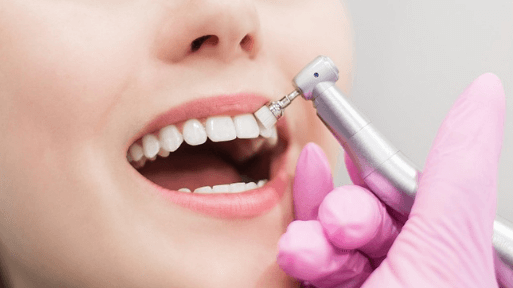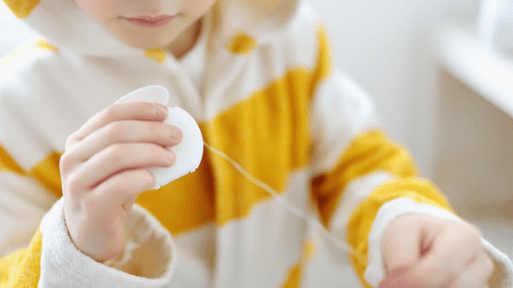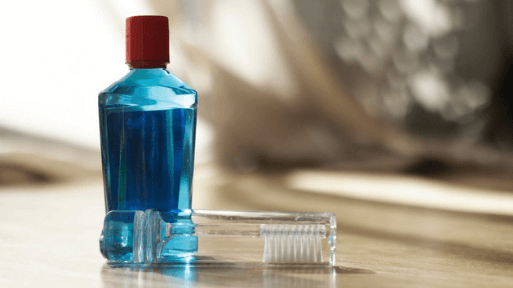5 Tips for a Stunning Wedding Smile
 Is your big day around the corner? Get your smile ready for the cameras with these five tips.
Is your big day around the corner? Get your smile ready for the cameras with these five tips.
Beware of Foods that Stain Your Teeth
Here are a handful of common tooth-staining culprits:
- Coffee
- Tea
- Soda
- Red
- Berries
- Foods with bright artificial coloring
Consume these items in moderation and brush your teeth ASAP when you’re finished.
Drink Water
Dehydration is a problem you may not think about and is especially common if you are getting married during the hotter part of the year. Not only can dehydration sour your mood, it can also dry out your lips, creating a roadblock for your best smile.
Lipstick Matters
If you’re unsure which lipstick shade to choose, ask a make-up expert or check out the most requested lipstick shades brides want (pro tip: try before you buy).
Your Year for Veneers?
If there’s one cosmetic procedure that can do it all, it’s porcelain veneers. Strong, wafer-thin “shells,” they’re adhered to the front of teeth to give them a whole new appearance. They’re perfect for chip, cracks, gaps, minor crowding, small or misshapen teeth, and severe stains that don’t respond to whitening treatments.
Schedule a Pre-Wedding Visit to the Dentist
Make sure you visit your dentist regularly in the months leading up to your wedding. If you have any oral problems, such as teeth discoloration or crooked teeth, you should be seeing your dentist at least a year before the big day to ensure there is time for any lengthy wedding smile treatment plans. Schedule an appointment today to get your smile wedding-day ready!
Why You Should Visit a Dentist Twice a Year
 We often hear that we should go to the dentist every six months. Have you ever wondered why?
We often hear that we should go to the dentist every six months. Have you ever wondered why?
Brushing at Home isn’t Enough
Plaque and bacteria can build up between teeth and in other hard to reach areas. Only a dentist will be able to clean these areas. This is also because over time, plaque hardens and becomes difficult to remove. If left alone, this could also lead to the development of cavities and other oral problems.
Prevent Tooth Loss
The later a cavity is treated, the lower the tooth’s chances for survival. Regular dental checkups can ensure early identification of gum infections and periodontal disease.
How to Know if You Need a Filling
 Dental fillings fill holes in your teeth caused by decay. Fillings can also be used to repair broken teeth and teeth that have been worn down by grinding. But how do you know if you need a filling?
Dental fillings fill holes in your teeth caused by decay. Fillings can also be used to repair broken teeth and teeth that have been worn down by grinding. But how do you know if you need a filling?
Here are some symptoms that might indicate it’s time to get a filling:
- Achy teeth: These may come as sharp pains, dull aches, or general toothaches.
- If you have a tooth that is sensitive to hot or cold liquids and food
- Throbbing pain in your tooth
- Your food gets stuck on a certain tooth while eating
- Have a fractured or chipped tooth
- Rough on your tongue: If you run your tongue across the tooth and feel jagged edges that weren’t there before this may be a sign that the inside of the tooth is eroding
- You can see the problem: If you look at or in your mouth and a hole is visible, this is a sure sign that something is wrong
- Flossing fissures: When you start to see the floss becoming frayed after your gentle flossing at home this may be a sign that the tooth is becoming sharp and jagged pointing to tooth decay
- Discoloration of filling: Do you have composite resin fillings? Over time, these tooth-colored fillings can become darker or start to look slightly yellow. Replacing the filling will restore your tooth’s appearance and give you a brighter, more beautiful smile.
Are Sports Drinks Bad for Your Smile?
 People of all ages consume sports drinks under the assumption that they’re hydrating and they improve athletic performance. Unfortunately, your favorite sports drink is likely delivering sugars and acid—two things your smile could do without.
People of all ages consume sports drinks under the assumption that they’re hydrating and they improve athletic performance. Unfortunately, your favorite sports drink is likely delivering sugars and acid—two things your smile could do without.
A study by the Academy of General Dentistry found that 30-50% of American teens drink energy drinks, and approximately 62% have at least one energy drink per day. This high proportion is what leads to a high percentage of American teens facing dental issues.
Sports drinks like Gatorade and Powerade contain either natural or artificial sweeteners that convert to acids once they enter your mouth; this is your body’s attempt to start digesting them. To make matters worse, this mixture is in a liquid form, which means these acids bathe your teeth on all surfaces.
The best way to prevent dental damage caused by sports drinks is to opt for water instead. Water is the best way to hydrate the body and you won’t be putting your smile in harm’s way. Water also contains fluoride, so it helps strengthen your teeth as it rinses away bacteria in your mouth.
If you must grab a sports drink on occasion, try not to drink it over a long period of time and rinse your mouth with water immediately following.
Schedule an Appointment
If you’re an avid sports drink guzzler, look for signs that your beverage of choice has already caused damage. Are sports drinks causing you or your child issue with cavities or discoloration, or tooth sensitivity? Schedule an appointment with us and we’ll help you get your smile back to beautiful.
5 Tips for Getting Kids to Brush
 Brushing doesn’t have to be a chore. It can be a fun, family event! Try these five techniques to help your kiddos enjoy brushing, which sets them up for lifelong healthy hygiene habits.
Brushing doesn’t have to be a chore. It can be a fun, family event! Try these five techniques to help your kiddos enjoy brushing, which sets them up for lifelong healthy hygiene habits.
Include Rewards
What motivates your child? If it’s stickers, make a reward chart and let them add a sticker every time they brush. If they’re a reader, let them pick out the bedtime story. Maybe a few words of encouragement are all they need.
Hit Play!
When watching videos, children can see the correct tooth brushing technique in action and then replicate it on themselves. All it takes is a quick YouTube search.
Let Your Kid Play Dentist
Teaching kids to brush their teeth through role-playing can be fun. As the kid encourages the “patient” to embrace good dental care (stuffed animals are great at playing patients), they’ll also practice it in reality.
What are Tonsil Stones?
 When you hear the word stones in reference to a health issue, your mind probably goes straight to kidney stones. However, another type of stone that people have often never heard of until their dentist explains the condition is tonsil stones.
When you hear the word stones in reference to a health issue, your mind probably goes straight to kidney stones. However, another type of stone that people have often never heard of until their dentist explains the condition is tonsil stones.
Tonsil stones are usually about gravel-sized, but they can also be quite small (sometimes even too tiny to be seen with the naked eye). They’re usually soft and light yellowish or white in color. Typically, these spots pose no serious risks to your health and oftentimes can be removed easily at home. These stones are not a sign of illness or disease and they generally do not cause other negative effects on your health. But they can cause unpleasant symptoms, such as bad breath and discomfort in the back of the throat.
Common Causes of Tonsil Stones
Your tonsils are filled with nooks and crannies, the perfect hiding place for bacteria. As a result, the bacteria and debris combine to create a white pus formation in the pockets, and tonsil stones form when the trapped debris hardens.
The most common causes of tonsil stones include:
- Viral or bacterial infections
- Adenoviruses
- Influenza virus
- Herpes simplex virus
- Parainfluenza virus
- Enteroviruses
Worried About Tonsil Stones?
Are tonsil stones causing you discomfort in your day-to-day activities? Schedule an appointment with us to discuss potential remedies and preventative measures.
How to Prevent Dry Mouth While Sleeping
 Dry mouth affects the salivary glands, keeping your body from producing enough saliva to keep your mouth properly wet. You may produce some saliva but not enough or you may struggle to produce any saliva at all. Dry mouth symptoms can vary from one person to the next. The most common symptoms of dry mouth at night include:
Dry mouth affects the salivary glands, keeping your body from producing enough saliva to keep your mouth properly wet. You may produce some saliva but not enough or you may struggle to produce any saliva at all. Dry mouth symptoms can vary from one person to the next. The most common symptoms of dry mouth at night include:
- Waking up frequently to drink water
- Dry or sore throat
- Dry and/or chapped lips
- Bad breath in the morning
During the day, common symptoms of dry mouth can also include:
- Difficulty chewing, swallowing, or speaking
- Unpleasant taste or changes in the way food tastes
- A bad taste in your mouth
- Hoarseness
How to Know if You Need a Tooth Extraction
 Is your tooth causing you discomfort? Not sure whether getting it extracted is the answer? Here are a few ways to tell if you need a tooth extraction.
Is your tooth causing you discomfort? Not sure whether getting it extracted is the answer? Here are a few ways to tell if you need a tooth extraction.
Tooth Pain
A painful tooth could result from sensitive teeth or a cavity. However, in some cases, you may need your tooth removed if it’s too badly damaged, it’s still painful after a filling or other procedure, or if it’s becoming infected.
Overcrowding
Misaligned teeth can also be fixed with orthodontic treatments like Invisalign. However, if there’s not enough room in your mouth for all your teeth to properly fit, your teeth often end up quite crooked and displaced. For such treatments to work properly, you may need more room in your mouth for the teeth to move into position. Removing a tooth could be just what you need for a more natural and healthy mouth.
5 Signs You Should Schedule a Dentist Visit
 Visiting the dentist twice a year is a great way to maintain your oral health. But sometimes, additional visits are needed. If you’re experience any of these five signs, you should schedule a dentist visit soon.
Visiting the dentist twice a year is a great way to maintain your oral health. But sometimes, additional visits are needed. If you’re experience any of these five signs, you should schedule a dentist visit soon.
Tooth or Gum Pain
Lingering pain isn’t normal, and you shouldn’t have to live with it. If your teeth ache consistently, it could be a sign of some form of contamination. Bacteria could be targeting the nerve in the center of your teeth, which in turn, fast-tracks the progress of tooth decay. Persistent pain or swelling in your teeth or gums could be a sign that one of many different things is wrong, and you should have your dentist check for infection or gum disease.
Did you know inflammation in the gums causes an estimated 70% of tooth loss?
Why Your Gums Bleed When You Floss
 Flossing is important for your overall oral health. But if you’re like many other people, flossing causes your gums to bleed. Why is this happening? Let’s take a look at a few possible reasons.
Flossing is important for your overall oral health. But if you’re like many other people, flossing causes your gums to bleed. Why is this happening? Let’s take a look at a few possible reasons.
You’re New to Flossing
If you’re new to flossing or haven’t done it in a while, your gums are likely to bleed a bit at first. If the bleeding is minimal and stops quickly, it’s probably a sign your gums are a bit sensitive and need to get used to flossing. Continue flossing daily and the bleeding will soon subside.
You’re Brushing Too Hard
Bleeding gums can be a sign that you’re brushing too hard, or that the bristles of your brush are too stiff. Switch your brush out for soft bristles and you’ll quickly see an improvement in both irritation to your gums and bleeding while flossing.
What's the Best Mouthwash for Bad Breath?
 Having trouble deciding on a mouthwash? Not sure which one is the best choice? Mouthwashes of all types and flavors fill store shelves and can make it difficult to understand which is actually the best for defeating bad breath.
Having trouble deciding on a mouthwash? Not sure which one is the best choice? Mouthwashes of all types and flavors fill store shelves and can make it difficult to understand which is actually the best for defeating bad breath.
What causes bad breath?
Bad breath can be caused by numerous reasons, including:
- Smelly gases released by bacteria coating the teeth, tongue, and gums.
- Food particles get trapped in between the teeth
- Strong tasting food and drink like garlic and coffee
- Medical problems such as dry mouth
- Smoking cigarettes
- Infections in the nose or lungs
To keep your mouth healthy, bad bacteria must be removed by regular brushing, flossing, and mouthwash. However, many rely on an overpowering mint flavor to mask bad breath. Others contain a high level of alcohol, which you should be cautious about. It’s clinically proven that alcohol dries out your mouth, which worsens bad breath.

